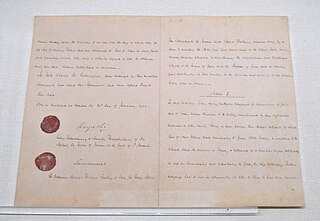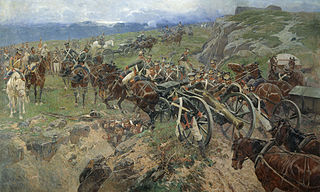
The 1810s was a decade of the Gregorian calendar that began on January 1, 1810, and ended on December 31, 1819.
Treaty of Paris may refer to one of many treaties signed in Paris, France:
"Northern Wars" is a term used for a series of wars fought in northern and northeastern Europe from the 16th to the 18th century. An internationally agreed-on nomenclature for these wars has not yet been devised. While the Great Northern War is generally considered to be the last of the Northern Wars, there are different scholarly opinions on which war constitutes the First Northern War.

The Napoleonic era is a period in the history of France and Europe. It is generally classified as including the fourth and final stage of the French Revolution, the first being the National Assembly, the second being the Legislative Assembly, and the third being the Directory. The Napoleonic era begins roughly with Napoleon Bonaparte's coup d'état, overthrowing the Directory, establishing the French Consulate, and ends during the Hundred Days and his defeat at the Battle of Waterloo. The Congress of Vienna soon set out to restore Europe to pre-French Revolution days. Napoleon brought political stability to a land torn by revolution and war. He made peace with the Roman Catholic Church and reversed the most radical religious policies of the Convention. In 1804 Napoleon promulgated the Civil Code, a revised body of civil law, which also helped stabilize French society. The Civil Code affirmed the political and legal equality of all adult men and established a merit-based society in which individuals advanced in education and employment because of talent rather than birth or social standing. The Civil Code confirmed many of the moderate revolutionary policies of the National Assembly but retracted measures passed by the more radical Convention. The code restored patriarchal authority in the family, for example, by making women and children subservient to male heads of households.

The first Anglo-Japanese Alliance was an alliance between Britain and Japan. It was in operation from 1902 to 1922. The original British goal was to prevent Russia from expanding in Manchuria while also preserving the territorial integrity of China and Korea. For the British, it marked the end of a period of "splendid isolation" while allowing for greater focus on protecting India and competing in the Anglo-German naval arms race. The alliance was part of a larger British strategy to reduce imperial overcommitment and recall the Royal Navy to defend Britain. The Japanese, on the other hand, gained international prestige from the alliance and used it as a foundation for their diplomacy for two decades. In 1905, the treaty was redefined in favor of Japan concerning Korea. It was renewed in 1911 for another ten years and replaced by the Four-Power Treaty in 1922.

Count Ivan Fyodorovich Paskevich-Erevansky, Serene Prince of Warsaw was an Imperial Russian military leader of Cossack origin who was the Namiestnik of Poland. Paskevich is known for leading Russian forces in Poland during the November uprising and for a series of leadership roles throughout the early and mid-19th century, such as the Russo-Persian War (1826–28) and the beginning phase of the Crimean War. In Russian history, he is remembered as a prominent military commander.
Battle of the Dardanelles may refer to:
Treaty of Bucharest may refer to the following treaties signed in Bucharest:

The Russo-Persian War of 1804–1813 was one of the many wars between the Persian Empire and Imperial Russia, and began like many of their wars as a territorial dispute. The new Persian king, Fath Ali Shah Qajar, wanted to consolidate the northernmost reaches of his kingdom—modern-day Georgia—which had been annexed by Tsar Paul I several years after the Russo-Persian War of 1796. Like his Persian counterpart, the Tsar Alexander I was also new to the throne and equally determined to control the disputed territories.
Russian campaign is the military campaign that took place in 1812 when Napoleon Bonaparte's Grande Armée invaded the Russian Empire.
Invasion of Russia can refer to:

The military history of the United Kingdom covers the period from the creation of the united Kingdom of Great Britain, with the political union of England and Scotland in 1707, to the present day.

War and Peace, subtitled Game of the Napoleonic Wars: 1805–1815, is a board wargame published by Avalon Hill in 1980 that simulates ten years of Napoleonic wars.
Crimean War (1853–1856) was a conflict between Russia and the alliance of France, Britain, the Ottoman Empire, and Sardinia.
The Russo-Ottoman alliance was a defensive alliance between the Russian Empire and the Ottoman Empire, directed against France between 1799 and 1806, during the Napoleonic Wars.
This page is based on this
Wikipedia article Text is available under the
CC BY-SA 4.0 license; additional terms may apply.
Images, videos and audio are available under their respective licenses.






